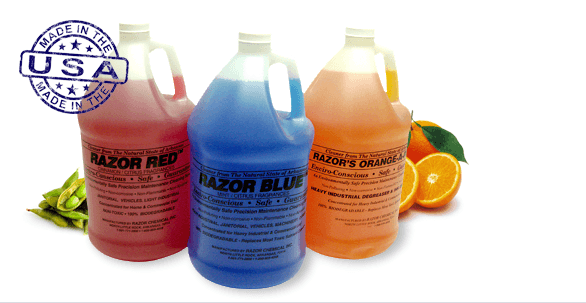Arkansas-based Razor Chemical sees three-fold increase in disinfectant production during pandemic
by May 5, 2020 1:14 pm 1,425 views

Entrepreneur Suni McClelland has owned and operated her Arkansas-based business, Razor Chemical, for 28 years. There have been other pandemics while she’s been in business, but nothing has compared to COVID-19, she told Talk Business & Politics.
One of the products she carries is Razor Citrus Breeze III, an industrial-grade disinfectant that she sells to hospitals, the Arkansas Department of Health, prisons, jails, and other commercial businesses. COVID-19 is a new virus, and what the Environmental Protection Agency does has identified certain products that have been successfully tested to disinfect surfaces from viruses that have similar traits to COVID-19. Razor Citrus Breeze III has been certified under the EPA’s Emerging Pathogen Policy, she said.
“I was excited to see that we were included under the EPA’s Emerging Pathogen Policy,” she said. “At times, we’ve been a little bit overwhelmed by this virus.”
In a typical year, Razor Chemical will produce about 17,000 gallons of its disinfectant or roughly 1,500 gallons per month. Since this outbreak started, the company has produced about 7,000 gallons in a little over a month, she said. And, the company only has two full-time employees and one part-timer.
“It’s been a challenge. We had to be a little more organized,” she said.
She and her staff have had to work overtime and on weekends to fill orders. McClelland said she had to order raw chemicals and packaging well in advance to meet the demand.
During the three decades she’s been in business, the only time she received a call during a pandemic was in 2014 when Ebola broke out in western Africa. Inquiries were made as to whether her disinfectant would be effective against that virus, which had a mortality rate of 90%.
It’s one area that McClelland said the general public needs to be better educated. Not all disinfectants kill all types of viruses and bacteria. Just because a surface is wiped down with disinfectant doesn’t mean the virus has been killed.
The EPA tests different products and their effectiveness against certain viruses and other surface contaminants. If the product is effective against a certain virus, the label will reflect that, she added. A lot of disinfectants will list coronavirus as one of the viruses it can kill, but that doesn’t necessarily mean it will kill COVID-19.
A little research on the EPA’s website can clear a lot of confusion about what products are deemed to be effective in killing the virus on surfaces, she said. Another common problem is that consumers don’t read the instructions on the label, and even products that are effective are not applied properly making them less effective.
“Read the instructions,” she said. “That’s the only way to ensure the disinfectant is going to be effective in removing the virus.”
